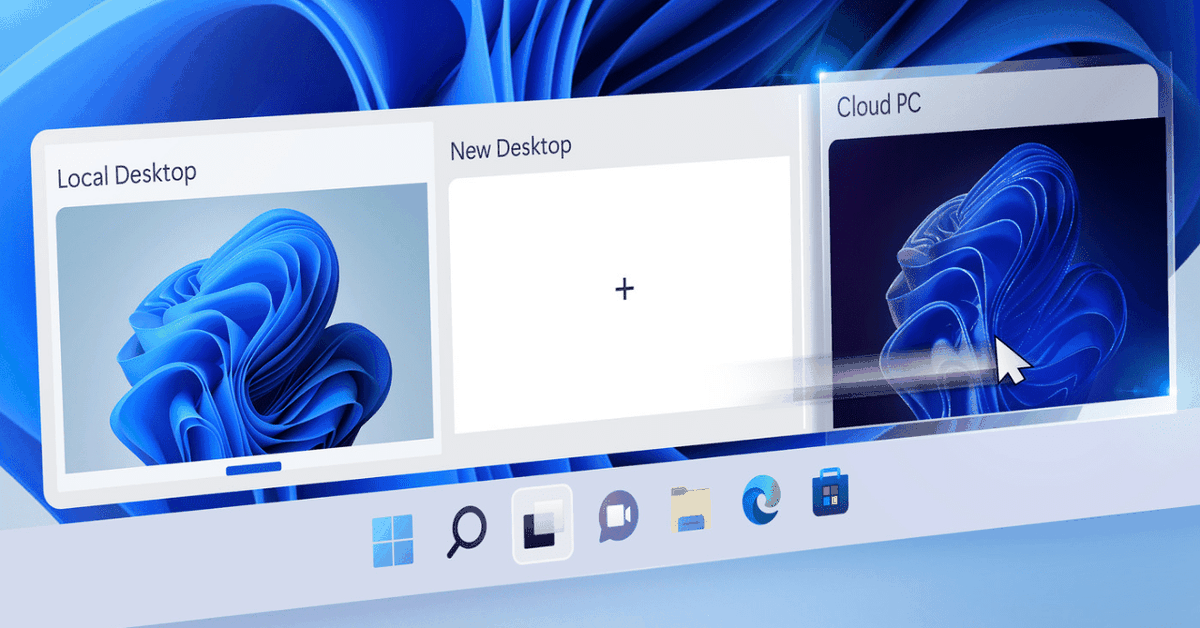- cross-posted to:
- technology@beehaw.org
- technology@lemmy.ml
- cross-posted to:
- technology@beehaw.org
- technology@lemmy.ml
“You will own nothing, and you will like it.”
“You will own nothing, and you will like it.”
Lol, Not long ago I was called a right wing conspiracy nut for using that quote.
Feel like this may be missing needed context.
For example, if I say, “man, I’m going to take a huge bite out of that thing!” it’s a different conversation if I’m looking at a big sandwich versus looking at a newborn baby.
So… Anything else you might want to share about your specific statement or its focus?
Ignore brainwashed people man
That’s a big nope for me.
Internet goes out? I can still do some amount of work, now I need power and internet to both work to do any work at all.
Not a fan of this and I will not embrace it.
Microsoft has recently announced Windows Copilot, an AI-powered assistant for Windows 11. Windows Copilot sits at the side of Windows 11, and can summarize content you’re viewing in apps, rewrite it, or even explain it. Microsoft is currently testing this internally and promised to release it to testers in June before rolling it out more broadly to Windows 11 users.
Oh my God, they’re bringing back clippy.
That means a whole new market of NFT Clippy Skins can be established.
That fixes the main problem with Clippy, which was not using a blockchain.
“It looks like you’re trying to defraud people. Would you like help with that?”
If it’s GPT4 though I might sell my soul for that kind of automation integrated into my PC…
Don’t worry, you will.
That’s essentially the deal you’d be making. OpenAI requires your mobile number to create an account, and I’m certain Microsoft will identify you in any way it can too. Your choice is to give up any anonymity and have everything you ever wondered about recorded for all time in exchange for the privilege of asking Neo-Clippy how to deal with your toenail fungus. (I’m certain he’ll have a product to recommend for it, too.)
The only way this wouldn’t be a nightmare would be to have a local, pretrained GPT database (like ShareGPT_Vicuna_unfiltered) that is updated like any other system update, thereby keeping your queries local only to you while still providing regular knowledge updates.
And they will never, ever do that because that doesn’t extract value from you.
Didn’t read the article.
The idea of online only software irritates me. Of course multiplayer games have to work this way. When blizzard and Ubisoft started requiring an active connection for single player games that was just going too far.
Can you imagine sitting at your computer, doing literally anything. The screen goes strait to blue with the windows shutting down screen saying, “Internet disrupted, please contact your provider for support”.
Or trying to do any work on the go? This whole idea is just idiotic to me.
They will have to continue to offer some kind of offline option it seems, for people with flaky internet connections.
Never mind flaky internet, what about people that do events?
Things like PowerPoint presentation machines, VJ systems, video servers (for massive multiscreen playback).
You can’t go into a field for a festival and expect reliable internet.
You can’t go into a theatre and expect reliable internet, especially when 3k+ people turn up.
There are a few systems that run OSX, but Apple’s hardware doesn’t give you as much control as something like an Nvidia Quadro with sync cards. 99% of the big shows will be ran from Windows OSI guess even a chromebook has some sort of offline apps and storage.
I guess that means more people switching to linux, assuming they eventually 100% phase out non-cloud. Not even because “cloud bad” - there will be some of that, but because of the sheer number of people who don’t pay for windows, not paying for it isn’t an option if they control it completely.
Will this actually be the straw that breaks the camel’s back, or will everyone just continue to say “but I can only do this on a PC” and not even attempt to look at Linux or MacOS as an alternative.
My moneys on the latter. People have been complaining about anti-consumer practices from Microsoft since Windows 7, but it always ends the same way. Microsoft has most of the world by the balls and they know they can squeeze tighter and tighter and not lose 99% of their customers.
Yup, that’d also be the case for people like me who stick with Windows for gaming compatibility/convenience reasons and critical GPU features the Linux drivers just don’t implement (looking at you, DLDSR). That, or just anyone with a GPU, I suppose, assuming the hardware market would look remotely like it does nowadays by then.
There’s definitely going to be a push for cloud gaming / cloud GPU + VDI, and with GPU pricing going the way nvidia is doing right now isn’t going to help prevent adoption of that.
and I want to move fully off of windows, what a coincidence.
The situation has never been better for comfortably abandoning Windows. Come to Linux, we have penguins
tbh, windows user since the 90s, tried *nix desktops since the early 00s every few years. Used to have a thing where I would force myself to use it for 6 months and it would fail again and again.
In the last year, ive been using ubuntu (which i know isint the best desktop to use even) as a dev system on some of my work. Unlike in the past I am no longer finding an unreasonable delta between the user expectations in linux vs windows systems. I need to drop to a cli for both with ~ the same propensity once I do anything advanced. Not having a registry is a blessing I never thought I would be able to have in a rich visual system.
Long time .NET / Azure dev - moving to linux. After all, what do you think remote windows will run under-the-covers?
That’s a pretty similar story to mine. Used Linux pretty exclusively over a decade ago, then switched back for my gaming PC. Now that I’m back on Linux though, I don’t see any reason to use windows on anything but my company PC, Linux is just better IMO now.
Azure Linux with a strong Wine hahahahaha
pretty much, though my understanding is they ended up making thier own “wine” that leverages hyper-v. Seems like they are still banking on thier own hypervisor. Can’t say I blame them. no way MS hands thier ops to VMWare.
EDIT: Honestly, I would expect NT4 based windows to be sunset within a decade in place of a linux kernel version that has a window manager developed in microsoft’s signature style. A large number of newer UWP apps will port relatively easily if already written on .NET core and microsoft has indicated they are starting to think more like apple when it comes to some levels of compatibility.
As another dev here, I have barely used a PC/laptop outside of work in years. I got a gaming PC like 2 years back and don’t use it much. But every time I get the hankering for some personal dev project and have to mess with the registry I cry inside. I really need to just ditch it for Linux entirely. I’m so much more comfortable on Linux. You might just convince me to bite the bullet and remove it entirely since 90% of my gaming is on steamdeck anyway.
Since WSL2 and terminal preview I have spent more time doing “nix things” than windows things anyway, I even do a lot of windows file management through ubuntu since the Linux tools are more expressive.
Much of my day is web browser, cli and VSCode. The desktops are capable, at this point its more about getting used to a different set of keyboard shortcuts, my next build out will be a linux system for sure.
Are we doing the nobody reads the article thing here too? This isn’t a replacement for Windows as an operating system, it’s a cloud based version of the OS being sold to consumers. They’re trying to compete with inexpensive Chromebooks, not take away your PC.
As an occasional sys admin, they’ve had stuff like this for enterprise forever, it’s just self hosted. This is about as surprising as the sun coming up, they’ve been moving lots of their enterprise tech to consumer subscriptions.
Why would I read the article? I don’t want to know the details. I want to be outraged.
I did, but it sounds like what the headlines implied to me
Microsoft has been increasingly moving Windows to the cloud on the commercial side with Windows 365, but the software giant also wants to do the same for consumers.
The idea of moving Windows fully to the cloud for consumers is also presented alongside Microsoft’s need to invest in custom silicon partnerships.
Yeah, it is fair to say it’s just an alternative option to a non cloud based OS, but some people are extrapolating based on Microsoft moves the past few years with the subscription model they’ve pushed for Office and OS coming with office versions that require you to sign in to an account to use.
And versions of Windows that don’t come with pre-installed ad apps like Facebook or Candy Crush aren’t commercially available.
No thank you.
Also I bet instead of a one-time license you can have the privilege of paying $9.99 a month forever or lose access to all your files. And possibly requiring an internet connection to use your desktop computer?
Well of course they do. They want to turn an every-few-years OS purchase into a monthly subscription fee, like they did with O365. And eventually they’ll drop the ability to install apps except through their store (under the guise of providing “safety” from malicious apps), so that they can collect a commission on the third party software sales market as well.
It’s depressing to see. Unfortunately I’m heavily invested in music software which is not available on Linux. If Microsoft actually does this it could get to the point where even a switch to Apple seems better. But Linux is the only satisfactory and viable solution for actually having control of your machine.
WINE and similar tools have gotten really good in the past few years. Valve’s Proton compatibility layer is good too, despite being designed for gaming many people are using it to run software which WINE itself struggles with.
It could very well be possible to run your music software with minimal tinkering.
The share holders they need more!!!
lets eat the shareholders
Google tried that.
Anyway, I’ll stick with Linux.
With Chromebooks? ChromeOS is a pretty solid Linux distro if you’d ask me. It is built around cloud-sync and Google Drive, but otherwise perfectly fine to use offline. Even Steam is supported nowadays
The best thing I ever did with that one used Chromebook I bought was install Gallium OS on it. I ended up with a fully functioning laptop that was able to fulfill my mobile computing needs for $50. It’s a shame Gallium got discontinued. ChromeOS was very primitive and restrictive when I tried it 5 or 6 years ago, but you say they even support Steam now, so apparently they’ve made some improvements. Still wouldn’t want to use it over a Linux distro like Gallium that would let me have full control of the device, though.
In case anyone reading this is interesting in alternatives to ChromeOS, more info can be found here: https://mrchromebox.tech/#alt_os
Ya I’d be fully Linux after that. Still too many benefits of having your own hardware.
Haha that will be the year of the Linux desktop, in many ways
Okay but what happens if you don’t have a good net connection like at the coffee shop or airports? I swear sometimes people are clueless and just assume you always have good internet when that’s not often the case!
Don’t worry, you’ll be able to purchase super duper satellite internet from microsoft. Or something.
As someone who works in cloud services/ops and has to deal with Microsoft partner relations almost daily, good luck with that.
I’m kind of confused…if the plan is to move Windows fully to the cloud, why are they talking to chipmakers about enabling more Windows features in future chip releases? Why would you need processing power for the OS if the OS is fully on the cloud?
Client side rendering and stuff? Your youtube video is still rendered locally.
Makes me think DRM and TPM functions as well in that case too.






















